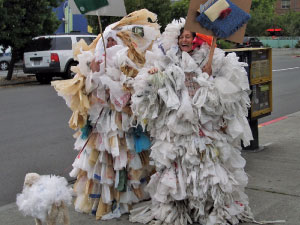From Seattle to Jerusalem: sustainable ideas ripple around the world
by Heather Trim, People For Puget Sound
This article was originally published in November 2008

A successful signature campaign funded by the plastics industry through the American Chemistry Council has halted implementation of a 20-cent “green” fee on many single-use bags and forced it to a citywide referendum in 2009.
Whether voters ratify or reject the fee, we in Puget Sound have started a movement that’s inspiring others far away.
The environmental leadership of Seattle is having a ripple effect around the world. During a recent trip to Jerusalem, a friend saw people there starting to refuse plastic bags at check-out counters.
A woman brought her own container to a restaurant for carryout food to avoid taking styrofoam, and in a chronically trash-strewn neighborhood, a litter clean-up and education effort was launched. They were propelled to change habits because of what they heard we were doing in Seattle.
The New York Times, Associated Press and other media had carried the news that Seattle was on the brink of instituting a ban on Styrofoam carry-out and food containers, and of becoming the first American city to implement a 20-cent “green fee” on disposable paper and plastic bags. Many of us in Seattle were jumping with glee over these proposals, hard-won after more than a year of citizen activism.
One Seattle friend, however, was in Israel when the news broke. Being half a world away, she had no one to celebrate with. All she could do was tell her friends in Israel what grassroots organizers and a supportive co-op (PCC Natural Markets!) were able to achieve.
Hearing of the successes in Seattle, her friends in Jerusalem became more self-conscious about their Styrofoam and bag use. People had been aware of the need to change personal habits of consumption but were inspired by what was happening far away in the Pacific Northwest.
Soon enough, two of her friends, Sarah and Yakov, were declaring proudly that they had brought cloth bags with them to the shouk (public market) to do their shopping. “We’ve had the bags in the closet,” Yakov said, “I don’t know why we didn’t bring them before.”
Chaya Devorah confessed with dismay that she had forgotten her bags when she went to the grocery store.
Ariella tried to tell a cashier she didn’t need a plastic bag and practically got into an argument when he insisted she needed to take one.
And Chava — after hearing about the grassroots success in Seattle — decided to start a neighborhood cleanup and education campaign to address rampant litter, mostly plastic and paper, that blights her orthodox neighborhood.
The movement toward reducing single-use disposable items — such as plastic and paper bags — is full of stories such as these. Although recycling programs help relieve some of our concern, more and more people are questioning whether our society is more burdened than helped by these disposable “conveniences.” We’ve seen that people around the world really care about this issue; they’re eager for solutions.
The practice of charging for disposable bags actually started more than 15 years ago in Europe and has spread now to lands as diverse as Australia, Taiwan and China. Ireland reduced its plastic bag usage by 90 percent in just one year with a 15-cent per bag charge.
With Seattle and a few other West Coast cities leading the way in the United States, the door was opened for more American cities to take responsibility for the environmental degradation caused by disposable products. In August, two islands in Hawaii passed plastic bag bans. Numerous other U.S. cities are considering fees and bans.
Seattle’s city council and mayor stepped up to do something about it in June 2007 — initiating a significant zero-waste program — followed by the bag fee ordinance in July this year. Addressing the 360 million bags used by Seattleites every year is just the beginning.
We’re hoping that residents and policy makers in cities adjacent to Seattle will be inspired to adopt measures to deal with the waste in their jurisdictions, too. You could be the very person to make that happen — just as it began in Seattle with a handful of caring people.
